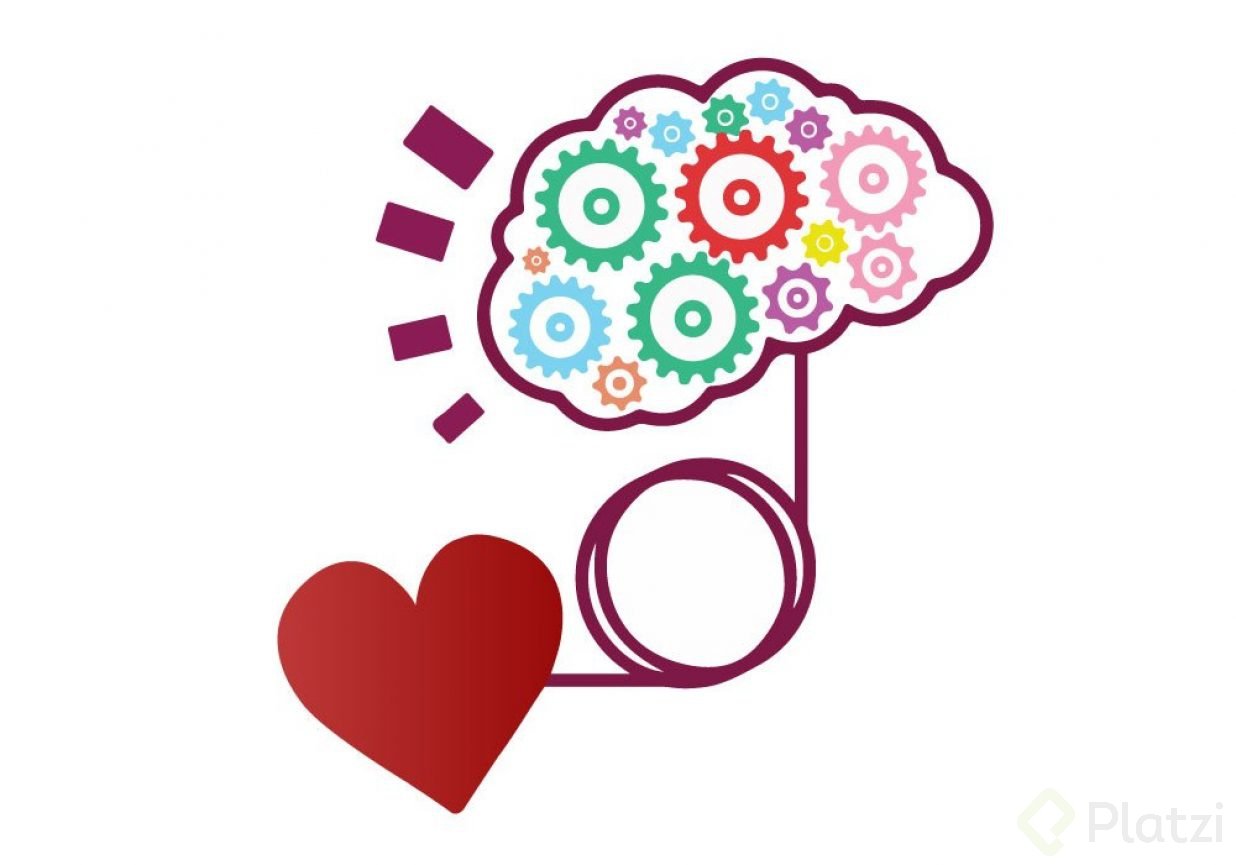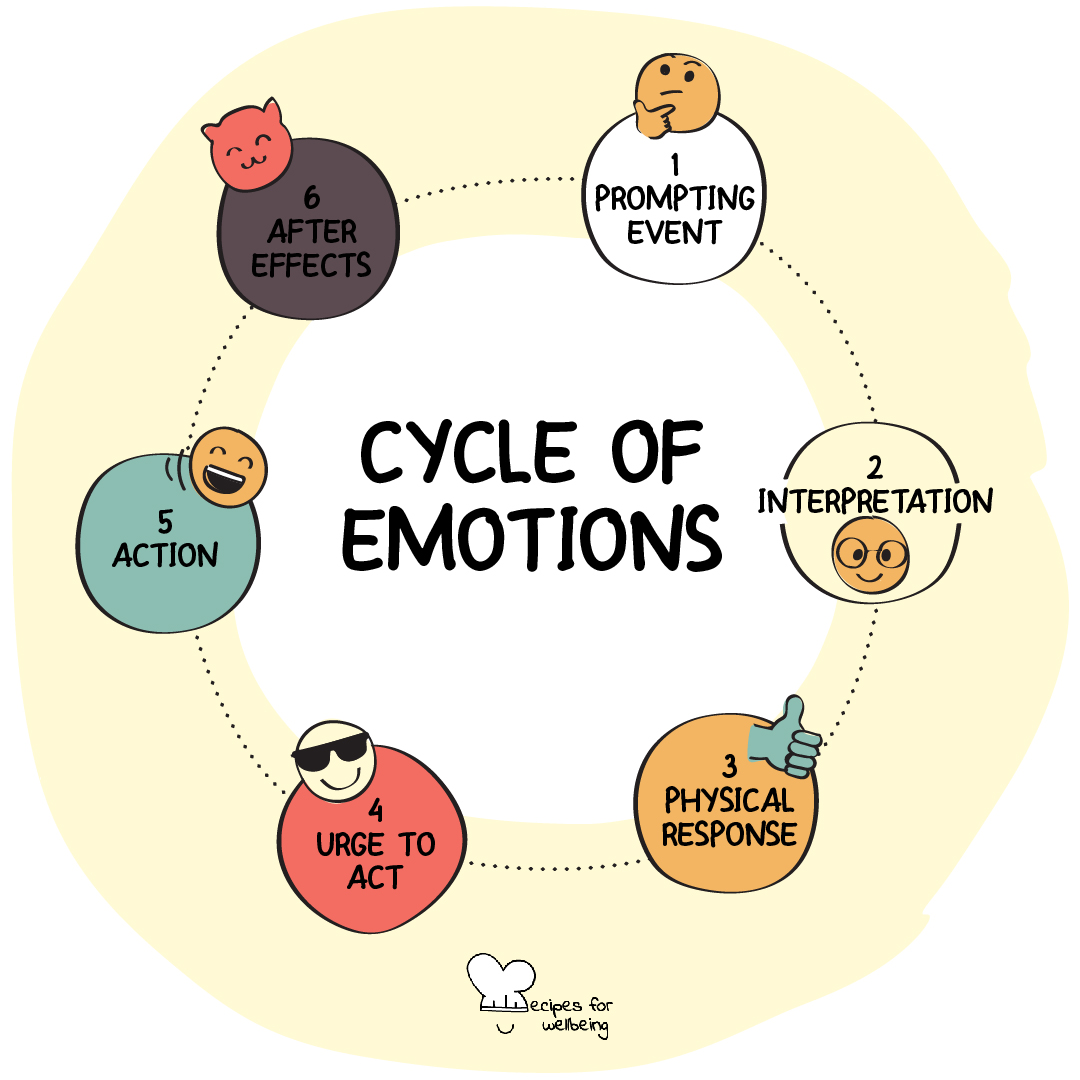Emotional intelligence (EI) is the ability to understand, manage, and use emotions effectively—both our own and those of others. It's about being aware of emotions, recognizing how they affect our behavior and decisions, and using this awareness to manage relationships in healthy ways. EI involves skills like empathy, self-awareness, self-regulation, motivation, and social skills.
The concept of emotional intelligence became widely popular through psychologist Daniel Goleman's work in the 1990s, though the idea itself has roots in earlier research on social intelligence. Goleman proposed that, contrary to the belief that success is purely based on cognitive intelligence (IQ), EI plays a critical role in personal and professional success.
How does emotional intelligence work?
Emotions impact thoughts and actions, so Emotional
Intelligence (EI) aims to help you understand how they develop and the best way
to manage them.
There are six moments in the emotional process:
- Moment 1: The stimulus or event
- Moment 2: A basic emotion arises
As a result of this stimulus or event, an emotion arises
naturally and quickly. It could be anger, surprise, or something else
manifesting intensely and unavoidably. You feel frustration or anger instantly,
as the event—receiving the last-minute task—is beyond your control. The emotion
appears naturally and is intense.
- Moment 3: Thought is involved
- Moment 4: Actions are taken
All emotions are meant to mobilize us into action, and our
brain is there to help us shape them. Feeding the emotion can lead to acting
irrationally. Instead, if you think positively, focus on solutions, and open
yourself to new possibilities. Rather than acting impulsively (like refusing to
do the task or doing it with a bad attitude), you choose to use self-regulation
and focus on solutions. You might think about how to organize yourself to
finish quickly or ask for support if possible.
- Moment 5: Results are reaped
- Moment 6: Beliefs are formed
Beliefs can be positive or negative, as they are ideas, we
have about ourselves. When negative, they hinder our path toward our goals, but
when positive or neutral, they support our life objectives. By handling the
situation positively, you reinforce a constructive belief about yourself, like,
“I can handle pressure effectively” or “I am capable of adapting in difficult
situations.” This belief contributes to your self-confidence and future
success.
Importance of emotional intelligence
According to Bradberry and Greaves, due to the structure of
the human brain, a person’s first reaction to any event is emotional, as it is
a natural biological response. However, not everyone is able to accurately
identify their own emotions. But this can be improved.
Emotions are fundamental in human life, as they not only
affect attention but also modify certain response behaviors and memory.
Therefore, recognizing emotions allows people to learn how to channel them more
effectively and connect more easily with others.
By managing emotions, it is possible to verbalize these mental states by assigning names to identify them as feelings, transforming them from primitive reactions into responses that help face daily .life in a better wayAdditionally, high emotional intelligence promotes self-awareness, helping to build strong relationships, make good decisions, and cope with difficult situations. It also increases the sense of well-being by enabling better decision-making.Thus, people with a high degree of self-awareness know and are confident about what they do well, what motivates and satisfies them, as well as the people and situations that cause them to lose control.
Components of Emotional Intelligence (EI)
Self-Awareness: This is the ability to recognize and
understand your own emotions, strengths, weaknesses, and motivations. A person
with high self-awareness can recognize how their feelings affect their thoughts
and behaviors, which helps them respond more thoughtfully to situations. For
example, if you're feeling anxious, you can identify that emotion, understand
its source, and avoid reacting impulsively. Tips to improve self-awareness
include keeping a journal of your emotions and actively seeking feedback from
others.
Self-Regulation: This involves managing one’s emotions in a
healthy way. It’s about controlling impulsive reactions, thinking before
acting, and being able to handle situations calmly. People who excel at
self-regulation tend to be more adaptable, resilient, and comfortable with
change. For example, if a team project hits a setback, a self-regulated person
will approach the issue with a calm and constructive attitude rather than panic
or frustration. Practices to boost self-regulation include mindfulness exercises,
such as deep breathing or meditation, which help maintain emotional control.
Motivation: Motivation within EI is about having a drive to
improve and achieve goals for personal satisfaction, rather than for external
rewards. Highly motivated individuals are often resilient, focused on achieving
long-term success, and show a strong commitment to their work. For instance, a
motivated individual in a team setting will push through challenges with
optimism and perseverance, inspiring others along the way. Goal-setting
techniques, such as creating SMART (Specific, Measurable, Achievable, Relevant,
Time-Bound) goals, can enhance this component.
Empathy: Empathy is the ability to understand and feel the
emotions of others. It goes beyond just sympathizing with someone—it’s about
genuinely feeling what they’re going through. Empathetic individuals are
skilled at managing relationships and understanding the needs of their
colleagues or clients, making them highly effective in teamwork and leadership
roles. Developing empathy often involves active listening, which means focusing
fully on the speaker without planning your own response as they speak.
Social Skills: This component encompasses a wide range of
interpersonal skills, such as communication, conflict resolution, and teamwork.
Those with strong social skills can effectively lead and work with others by
fostering a sense of connection and cooperation. They are adept at managing
both personal and professional relationships, ensuring they are supportive and
collaborative. Social skills can be honed through group activities, public
speaking exercises, and practicing clear, open communication.


:max_bytes(150000):strip_icc()/an-overview-of-the-types-of-emotions-4163976-abaafd59e7214706b7cd6326d0dd8257.png)



